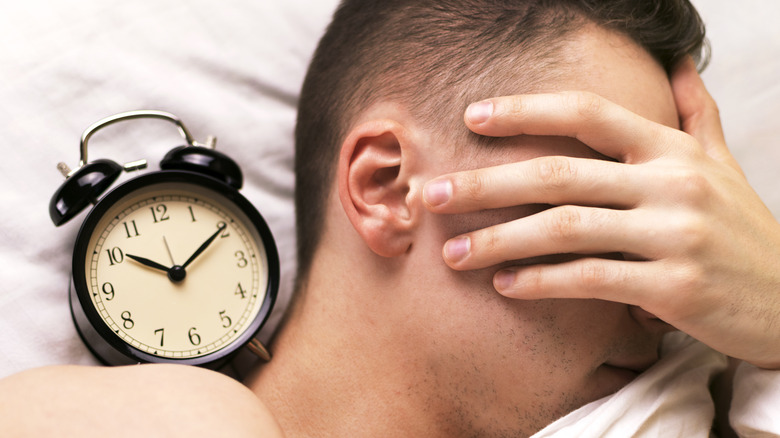What It Really Means When You Have Trouble Waking Up In The Morning
A snoring partner, an all-nighter spent studying, or a stressful nightmare are all sleep disruptions that would understandably make getting up in the morning difficult. But what if, despite getting a pristine night's sleep, you chronically find yourself having trouble waking up in the morning? What exactly is going on in the body that is causing this to happen?
While there are many different sleep patterns a person may engage in, what's considered the average sleep pattern is known as monophasic sleep. It is made up of about an 8-hour period of sleep nightly within a 24-hour cycle, according to MedicalNewsToday. In a 2017 data collection involving over 6 billion nights of customers' sleep habits, fitness products company, Fitbit, found that the average national bedtime in the U.S. is 11:21 p.m. (via Yahoo! News). However, if you find that your natural bedtime seems to fall much later into the night, you may be experiencing a unique sleep disorder that's causing you difficulty in the morning. Rather than hitting the hay at 11:21 p.m., if you find that you're routinely climbing into bed between 1 a.m. and 4 a.m., you may be experiencing delayed sleep phase syndrome (DSPS), according to WebMD.
What is delayed sleep phase syndrome?
As per Stanford Health Care, DSPS is defined as "a disorder in which a person's sleep is delayed by two hours or more beyond what is considered an acceptable or conventional bedtime." Those who experience the disorder often have trouble falling asleep before midnight, as they continue to feel awake and alert throughout earlier hours of the night. In addition, waking up early — even at a "normal" hour — is particularly difficult for these individuals and often impacts their ability to function during the day.
DSPS is commonly observed in adolescents, with prevalence rates standing between 7-16% (via Stanford Health Care). Due to these irregularities in the internal body clock, Dr. Lisa Shives, a specialist in sleep disorders, tells WebMD that gradual bedtime changes can improve daytime functioning. "Normally, I can help them a bit," Dr. Shives told WebMD. "If patients are going to bed at 4 in the morning, I'm not going to get them to 11 p.m. But I can roll them back to 1 or 2 a.m., and that generally makes them pretty happy."
Dr. Shives outlined via WebMD how people can implement these methods on their own to help make waking up easier. For example, progressively going to bed 15 minutes earlier, as well as waking up 15 minutes earlier, every 3 to 4 days can help get individuals on track. For those who are unable to self-correct their sleep schedule, Stanford Health Care suggests bright light therapy and chronotherapy.


